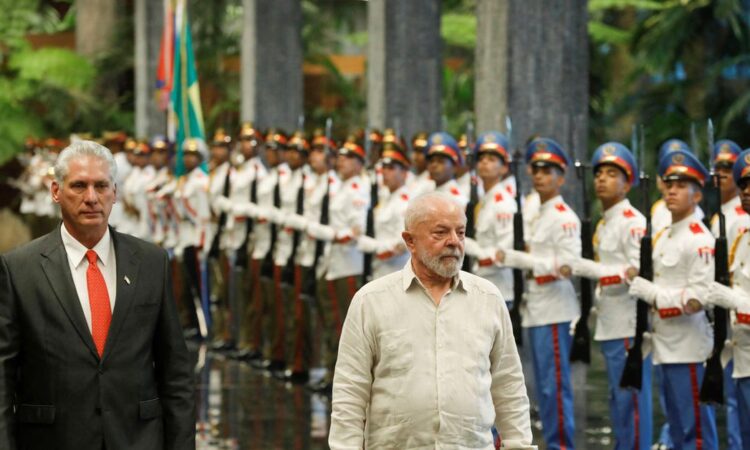Brazil’s president calls U.S. economic embargo on Cuba ‘illegal,’ condemns terrorist list label

[1/2]Cuba’s President Miguel Diaz-Canel and Brazil’s President Luiz Inacio Lula da Silva review an honour guard at the Revolution Palace during the G77+China summit in Havana, Cuba, September 16, 2023. REUTERS/Alexandre Meneghini Acquire Licensing Rights
BRASILIA, Sept 16 (Reuters) – On his first trip to Cuba during his third term in office, Brazilian President Luiz Inacio Lula da Silva called the embargo imposed by the United States on the island “illegal” and denounced the island’s inclusion on the list of state sponsors of terrorism.
Former U.S. President Donald Trump included the island nation on the U.S. list of state sponsors of terrorism, and though the Biden administration has reversed other Trump-era measures, it has so far not removed Cuba from the list.
“Cuba has been an advocate of fairer global governance. And to this day it is the victim of an illegal economic embargo,” Lula said in a speech opening the G77 Summit of developing nations in the capital, Havana. “Brazil is against any unilateral coercive measure. We reject Cuba’s inclusion on the list of states sponsoring terrorism.”
The comments were made just hours before Lula left for New York, where he will attend the United Nations General Assembly and have bilateral talks with Biden.
Earlier, Cuba expressed concerns over the label and Washington’s decades-old Cold War-era economic embargo against the island governed by the Communist Party of Cuba. The 27-member European Union, the country’s top trade partner, has also repeatedly rejected trade embargo. Cuba and critics of the economic sanctions say the embargo prevents and hampers access to food, medicine and other critical development supplies.
The U.S. State Department did not immediately respond to a request for comment on Lula’s remarks.
The Biden administration has previously said U.S. law includes exemptions and authorizations for exports of food, medicine, and other humanitarian goods to the island.
During the Assembly, Brazil is expected to return to its historic position of condemning the embargo on Cuba, one of the motions that is usually voted on every year at the United Nations and passes overwhelmingly. In 2019, during the first year of right-wing Jair Bolsonaro’s administration, Brazil voted against the motion along with the United States and Israel.
Lula also used his speech to call once again for the investment promised by developed countries to reduce the impact of climate change, as established in the Paris Agreement, but which has not been fulfilled. The president said that developing countries do not have the same “historical debt” as the rich for global warming.
“The principle of common but differentiated responsibilities remains valid. That is why all developing countries must be guaranteed climate funds, according to their needs and priorities,” he said.
Reporting by Lisandra Paraguassu; Writing by Steven Grattan; Editing by Aurora Ellis
Our Standards: The Thomson Reuters Trust Principles.






